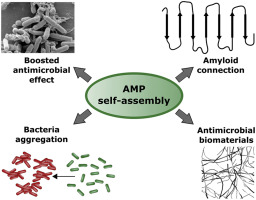Current Opinion in Colloid & Interface Science ( IF 7.9 ) Pub Date : 2018-10-01 , DOI: 10.1016/j.cocis.2018.09.002 Sara Malekkhaiat Häffner , Martin Malmsten

|
With a rapidly growing number of bacterial strains displaying resistance against conventional antibiotics, the development of novel types of antimicrobial agents represents an important health challenge. Antimicrobial peptides (AMPs) has attracted interest in this context, as these can be designed to display potent broad-spectrum antimicrobial as well as anti-inflammatory effects, but simultaneously low toxicity against human cells. Much of the work on AMPs has been focused on membrane interactions of monomeric AMPs, and how these can be controlled by peptide design to obtain selective disruption of bacterial membranes. However, a growing body of research has demonstrated that AMPs offer opportunities as antimicrobials beyond this through their self-assembly. An overview is therefore provided of the current understanding of the interplay between AMP aggregation and antimicrobial effects, including the role of oligomerization and self-assembly on membrane interactions and antimicrobial effects, AMP interactions with amyloid-forming peptides/proteins, AMP self-assemblies as antimicrobial biomaterials, and AMP-induced flocculation of bacteria and bacterial lipopolysaccharides as a novel pathway for confinement of infection and inflammation.
中文翻译:

自组装对抗菌肽性能的影响
随着越来越多的细菌菌株显示出对常规抗生素的抗性,新型抗菌剂的开发代表了一项重要的健康挑战。在这种情况下,抗菌肽(AMPs)引起了人们的兴趣,因为它们可以被设计为显示有效的广谱抗菌和抗炎作用,但同时对人细胞的毒性较低。关于AMP的许多工作都集中在单体AMP的膜相互作用上,以及如何通过肽设计来控制这些相互作用以获得细菌膜的选择性破坏。但是,越来越多的研究表明,AMPs通过自身组装提供了更多的抗菌剂机会。











































 京公网安备 11010802027423号
京公网安备 11010802027423号